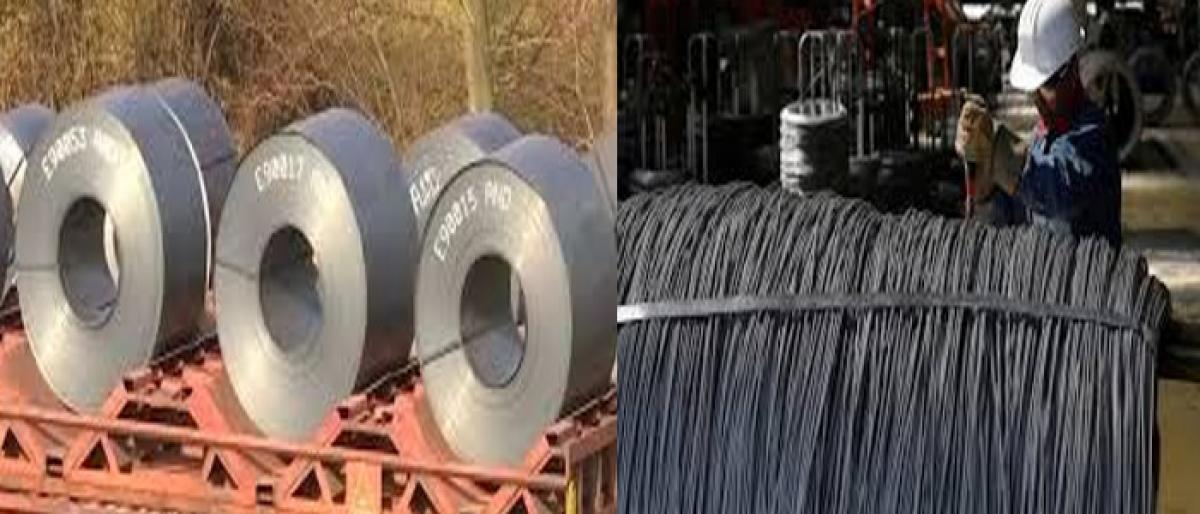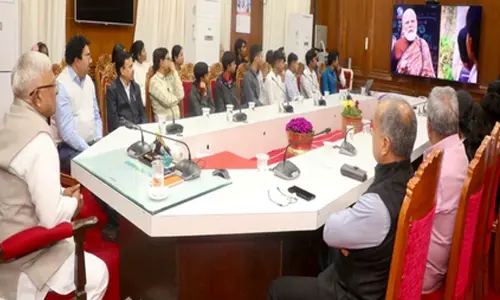US takes trade war to EU, Canada, Mexico door-step

The United States said on Thursday it will impose harsh tariffs on steel and aluminium imports from the European Union, Canada, Mexico at midnight (0400 GMT Friday) -- another move sure to anger Washington’s trading partners.
The United States said on Thursday it will impose harsh tariffs on steel and aluminium imports from the European Union, Canada, Mexico at midnight (0400 GMT Friday) -- another move sure to anger Washington’s trading partners.
The announcement by Commerce Secretary Wilbur Ross was sure to cast a long shadow over a meeting of finance ministers from the world’s Group of Seven top economies in Canada. Ross said talks with the EU had failed to reach a satisfactory agreement to convince Washington to continue the exemption from the tariffs imposed in March. Meanwhile, negotiations with Canada and Mexico to revise the North American Free Trade Agreement are “taking longer than we had hoped” and there is no “precise date” for concluding them, so their exemption also will be removed, Ross told reporters.
The announcement was confirmed by presidential proclamation shortly after Ross addressed reporters. Despite weeks of talks with his EU counterparts, Ross said the US was not willing to meet the European demand that the EU be “exempted permanently and unconditionally from these tariffs.” “We had discussions with the European Commission and while we made some progress, they also did not get to the point where it was warranted either to continue the temporary exemption or have a permanent exemption,” Ross said.
Ross downplayed the threats of retaliation from those countries but said talks can continue even amid the dispute to try to find a solution. President Donald Trump has the authority to alter the tariffs or impose quotas or “do anything he wishes at any point” -- allowing “potential flexibility” to resolve the issue. Trump imposed the tariffs of 25 per cent on steel and 10 per cent on aluminium using a national security justification, which Ross said encompasses a broad array of economic issues.
South Korea negotiated a steel quota, while Argentina, Australia and Brazil have arranged for “limitations on the volume they can ship to the US in lieu of tariffs,” Ross said. “We believe that this combined package achieves the original objectives we set out, which was to constrict imports to a level to allow those industries that operate domestically to do so on a self-sustaining basis going forward.” French Economy Minister Bruno Le Maire has warned before the announcement that the EU would take “all necessary measures” if the US imposed the tariffs.
“World trade is not a gunfight at the OK Corral,” Le Maire quipped, referring to a 1957 western movie “It's not everyone attacking the other and we see who remains standing at the end,” he said, declaring that the stiff taxes would be “unjustified, unjustifiable and dangerous”. German Chancellor Angela Merkel said the EU would respond in a “firm and united” manner to the tariffs. “We want to be exempt from these tariffs” which were “not compatible” with World Trade Organisation (WTO) rules, Merkel told a press conference with Portuguese premier Antonio Costa in Lisbon.
The greater danger from a US-China trade war is not just in higher tariffs or damage to trade, but the souring of Sino-American ties more broadly. Asia will have to be prepared for this possibility or it would make it very difficult for all the countries in region who are trying very hard to become friends with both or stay friends with both.
But the region would be affected in terms of the impact on the overall bilateral relationship between China and America, the difficulty they will have cooperating in many different areas where the world depends on them cooperating, and the awkwardness and the sourness in the relationship.
The US has threatened to impose tariffs on Chinese imports, and China has responded with a list of US imports it plans to impose tariffs on, roiling global markets and stoking fears of a trade war. Trade barriers would not only damage both countries but would also disrupt global supply chains, raising prices for consumers worldwide
The US imposition of tariffs on a range of Chinese imports – which amounts to a tax on imported goods – is the first step in a series of measures announced by the Trump administration. So far, China has responded by announcing tariffs on US imports. The next stage would be for the US to restrict Chinese investment into America.
Presumably, if this happens, then China would respond in kind. In other words, the tensions between the US and China could go beyond taxes and directly disrupt global supply chains as investment is targeted.
Any disruption to supply and distribution chains, which are a key part of world trade, could have a lasting impact. In the worst-case scenario, companies may have to relocate factories or distribution centres. Investment decisions affect employment and taxes raised, and are in some ways more disruptive than tariffs, which can be reversed more easily.
This escalation would be damaging for the US and Chinese economies since global companies, such as Apple, invest in both countries. This would affect not only US businesses but also American consumers. Retailers such as Walmart import goods from China, so prices would go up and living standards would be squeezed.
And since US goods are sold worldwide, if they are reliant on parts from China, consumers here in the UK and in the rest of the world would also be affected. The same applies to Chinese consumers and producers, particularly since about half of Chinese exports are made by enterprises with foreign investors.
The US is targeting hi-tech manufacturers to disrupt President Xi’s flagship industrial strategy, the Made in China 2025 plan, which seeks to make Chinese manufacturing globally competitive by introducing more artificial intelligence and automation. The ability of emerging economies such as China to “catch up” with rich economies depends on their being able to access and adapt the best technology in the world. This lies at the heart of the problem. The US has launched these trade measures in retaliation for China’s poor record on intellectual property rights protection, which includes requiring foreign companies to transfer their technology as a condition of investing in China.














